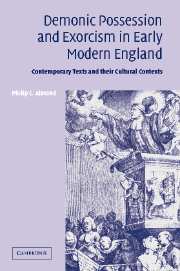 Demonic Possession and Exorcism in Early Modern England
Demonic Possession and Exorcism in Early Modern England Book contents
- Frontmatter
- Contents
- Preface
- Introduction
- Chapter 1 Disfigured by the Devil: The story of Alexander Nyndge
- Chapter 2 Two possessed maidens in London: The story of Agnes Briggs and Rachel Pinder
- Chapter 3 The witches of Warboys: The story of the Throckmorton children
- Chapter 4 The boy of Burton: The story of Thomas Darling
- Chapter 5 A household possessed: The story of the Lancashire seven
- Chapter 6 The counterfeit demoniac: The story of William Sommers
- Chapter 7 The puritan martyr: The story of Mary Glover
- Chapter 8 The boy of Bilson: The story of William Perry
- Chapter 9 A pious daughter: The story of Margaret Muschamp
- References
- Index
Chapter 1 - Disfigured by the Devil: The story of Alexander Nyndge
Published online by Cambridge University Press: 22 September 2009
- Frontmatter
- Contents
- Preface
- Introduction
- Chapter 1 Disfigured by the Devil: The story of Alexander Nyndge
- Chapter 2 Two possessed maidens in London: The story of Agnes Briggs and Rachel Pinder
- Chapter 3 The witches of Warboys: The story of the Throckmorton children
- Chapter 4 The boy of Burton: The story of Thomas Darling
- Chapter 5 A household possessed: The story of the Lancashire seven
- Chapter 6 The counterfeit demoniac: The story of William Sommers
- Chapter 7 The puritan martyr: The story of Mary Glover
- Chapter 8 The boy of Bilson: The story of William Perry
- Chapter 9 A pious daughter: The story of Margaret Muschamp
- References
- Index
Summary
To the Puritan family and household of Alexander Nyndge in Herringswell in Suffolk, it appeared that he might have been mad. On 20 January 1573, we are informed, he demonstrated a whole range of behaviours sufficient to lead them to this suspicion. His chest and body swelled, his eyes bulged, he shook, he refused to eat, he bashed his head and other parts of his body against the ground and the bedstead, he gnashed his teeth and foamed at the mouth, a lump ran up and down his body between the skin and the flesh, he was horribly disfigured, and he showed enormous strength.
Alexander's brother Edward, Master of Arts from Oxford University, read the symptoms quite differently. He saw them as the result, not of madness, but of Alexander's being possessed by a demon. It was a diagnosis which Alexander himself accepted: ‘Alexander Nyndge, having his speech then at liberty, said to the same Edward, “Brother, he is marvellously afraid of you, therefore I pray you, stand by me.”’ Alexander now speaks from the place which Edward has constructed for him and in the role which Edward has determined for him, as a person possessed by the devil. He physically shows the demon within: ‘And within a little time after, the body of the said Alexander, being as wondrously transformed as it was before, much like the picture of the Devil in a play, with a horrible roaring voice, sounding Hell-hound, was most horribly tormented.
- Type
- Chapter
- Information
- Demonic Possession and Exorcism in Early Modern EnglandContemporary Texts and their Cultural Contexts, pp. 43 - 57Publisher: Cambridge University PressPrint publication year: 2004
